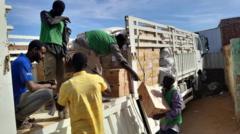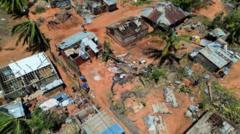**Aid arrives in Khartoum for the first time since the outbreak of civil war, as millions face urgent food shortages amid ongoing violence.**
**Humanitarian Aid Reaches Khartoum Amidst Ongoing Crisis**

**Humanitarian Aid Reaches Khartoum Amidst Ongoing Crisis**
**First food convoy delivers relief to Sudanese capital as famine conditions escalate.**
The ongoing humanitarian crisis in Sudan has taken a significant turn with the arrival of an aid convoy in the capital, Khartoum, marking the first delivery of food supplies since civil war erupted in April 2023. The country is currently grappling with one of the gravest hunger crises globally, compounded by clashes between the Sudanese army and the paramilitary Rapid Support Forces (RSF). Humanitarian workers expressed immense relief and joy upon witnessing the trucks loaded with aid arrive in south Khartoum, capturing the moment as one filled with both tears of joy and sheer exhaustion from their efforts to coordinate the delivery.
The United Nations and various community groups intervened to navigate through the complex security threats and roadblocks that had previously impeded aid distribution. Humanitarian worker Duaa Tariq noted the overwhelming emotions felt by many as the first shipment of 28 trucks, including five from UNICEF, reached health facilities like Al Bashayer Hospital. Ms. Tariq emphasized the dire need for assistance in Khartoum, with around 24.6 million people—nearly half the population—urgently requiring food support, according to the Integrated Food Phase Classification (IPC).
The escalated fight between the army and the RSF, which first began with a coup in 2021 escalating into civil conflict, poses grim predictions for the future. Recent reports indicate that estimates show up to 150,000 fatalities since the fighting began, while over 11 million individuals have been displaced from their homes. Efforts for peace talks have repeatedly faltered, leading to increasing concern over famine conditions in the region. The recent aid delivery has been a rare win for humanitarian efforts amid a backdrop of violence, highlighting the indispensable nature of aid Accessibility in alleviating the looming famine crisis.
The United Nations and various community groups intervened to navigate through the complex security threats and roadblocks that had previously impeded aid distribution. Humanitarian worker Duaa Tariq noted the overwhelming emotions felt by many as the first shipment of 28 trucks, including five from UNICEF, reached health facilities like Al Bashayer Hospital. Ms. Tariq emphasized the dire need for assistance in Khartoum, with around 24.6 million people—nearly half the population—urgently requiring food support, according to the Integrated Food Phase Classification (IPC).
The escalated fight between the army and the RSF, which first began with a coup in 2021 escalating into civil conflict, poses grim predictions for the future. Recent reports indicate that estimates show up to 150,000 fatalities since the fighting began, while over 11 million individuals have been displaced from their homes. Efforts for peace talks have repeatedly faltered, leading to increasing concern over famine conditions in the region. The recent aid delivery has been a rare win for humanitarian efforts amid a backdrop of violence, highlighting the indispensable nature of aid Accessibility in alleviating the looming famine crisis.





















